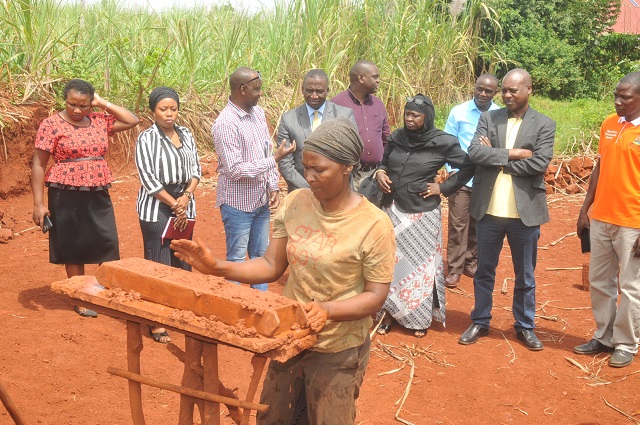
Kampala, Uganda | THE INDEPENDENT | A high level delegation from Gambia on Friday completed a five-day visit during which they bench-marked the Uganda Women Entrepreneurship Programme (UWEP) ahead of starting a similar one back home.
The delegation led by Bulli Dibba, the Permanent Secretary Ministry of Women, Children and Social Welfare, consisted of officials from the Gambian Central Bank and other ministries, departments and agencies.
They held several meetings with UWEP technical staff and also visited selected beneficiary groups in Kibuku and Jinja districts for a hands-on experience.
Dibba revealed that although they gained independence in 1965, his ministry has just been established and one of its strategic intervention is the economic empowerment of women, the reason they were here to learn from UWEP.
“Up to 52 percent of the population in The Gambia are women although they remain excluded from the economic development of our country. They are not even captured in the Gross Domestic Product (GDP) figures,” he said, adding that through the new ministry they now want to initiate the Women Enterprise Fund and UWEP provided good learning lessons.
He said already The Gambian Government together with the European Union have set aside Euros 12.6 million (approx. Shs 46.2 billion) for the Women Enterprise Fund and therefore it was critical for them to study running models of the same before implementation.
“This was a godsend learning visit since we realize that we would have made a huge mistake to go ahead with implementation without this trip to Uganda. Our initial idea was to run the Programme like a microfinance but we realize that the social approach that UWEP takes is better if we are to help the most vulnerable women,” Dibba noted.
“Even with the literature review, we knew that Uganda among other African countries had a system that is working for the women. We have had chance to look at the application, appraisal, disbursement and recovery processes which are facilitating the well implementation of UWEP,” he added.
Touray Fatoudeen, a delegation member, revealed that her over 20 years of working in the microfinance sector taught her that microfinance systems with stringent conditions as those imposed by conventional banking systems cannot help vulnerable women.
“The kind of women targeted by a social Programme like UWEP need to be uplifted to a certain level before they are introduced to microfinance and that’s the uniqueness of these women funds,” she said.
Bah Siaka, from The Gambian Central Bank, said they were more or less thinking of a microfinance approach which would have left out the most vulnerable women.
The acting Permanent Secretary, Ministry of Gender, Labour and Social Development, Mr. James Ebitu said the visit by the Gambian team was evidence that local interventions are receiving recognition beyond the Ugandan borders.
He implored the Gambians to ensure that barriers that prohibit rural women from accessing credit like demand for collateral, high interest rates and short repayment periods among others are eliminated from the Programme.
“The implementation criteria should be women-friendly and involve the participation of women and the communities in which they live. Effectively responding to the complaints, proper documentation and managing the high demand is also very critical,”Ebitu noted.
UWEP has been implemented over the last four years and has to-date financed 10,446 women projects across the country directly benefiting 130,258 women. The funds recovery has also been impressive currently standing at 77% of the total amount due.
Some of the key benefits of the Programme have been; increased access to affordable credit by women, financial inclusion of the women, acquisition of assets, increased income for the women, creation of over 110,000 direct jobs and 305,000 indirect employment opportunities, reduced dependence and enhanced knowledge and skills for women.
 The Independent Uganda: You get the Truth we Pay the Price
The Independent Uganda: You get the Truth we Pay the Price



